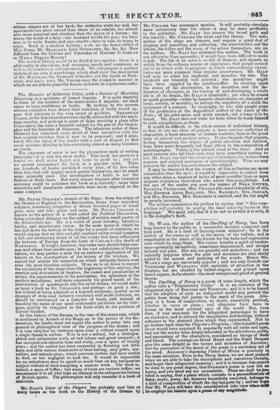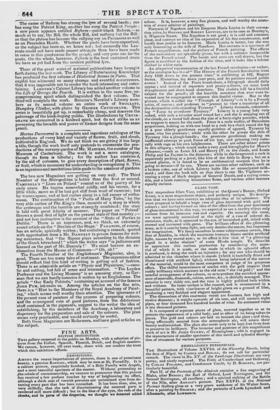Mr. WADE, "the author of the Dwelling of Fancy, has
been long known to the public as a successful musical composer and lyric poet. He is a kind of drawing-room minstrel ; he is the author of the verses as well as the music of his ballads, and is remarkable in the circle of his friends for the taste and expression with which he sings them. His verses breathe a spirit of tender-. ness—generally melancholy, sometimes impassioned, and always delicate and pure. His airs are graceful and melodious ; and (as naturally happens when the poet and musician are one) nicely suited to the accent and meaning of the words. Hence Mr. WADE'S songs are universally popular • and not only furnish our VESTRISES and WAYLETTS with materials of attraction in the theatres, but are chanted. by ballad-singers, and ground upon barrel-organs, in the streets—the most unequivocal proof of genera favour.
The Dwelling of Fancy is a poem of some length, which the author calls a "Fragmentary Canto." It is an imitation of the allegorical style of SPENSER and THOMSON; and it is to be feared that the adoption of such an antiquated model may prevent the public from doing full justice to the merit of the poem. Alle- gory is a form of composition, no doubt, essentially poetical, whether in verse or prose ; and allegories have been in favour in the most poetical ages of the world. But, even then, it was necessary for the allegorical personages to have an existence, and to interest the imagination and feelings, without reference to the abstract ideas which they represented. Not to go further back than the Pilgrim's Progress,—i his beautiful poem never would have acquired its popularity with all ranks and ages, had not the reader been deeply interested in the adventures, perils, and encounters of the characters, considered as beings of flesh and blood. The courageous Great Heart and the Giant Despair give the same delight as the heroes and monsters of ARIOSTO• and the perception of the moral of the poem is a secondary act oi the mind. ADDISON'S charming Vision of Mirza is precisely in the same situation. Even in the Faery Queen, we are most pleased when we are able to take the descriptions and narratives literally, and forget their allegorical meaning ; and it is because this cannot be done to any great degree, that SPENSER'S poem is now felt so heavy, and (we must say so) unreadable. Thus, we shall -beketified in saying, that a poem which consists in a personifieation of fancy, music, poesy, Ftc.• however beautifully executed, belongs to a kind of composition of which the- day has gone by ;- and•we hope that Mr. WADE will take this consideration into view whensext he employs his talents opon epee= of imymagnitude.- The cause of Reform has strung the lyre of several bards ; one has sung the Patriot King, another has sung the Patriot People : a new poem appears entitled Reform—point-blank Reform,—as much as to say, the Bill, the whole Bill, and nothing but the Bill : so that the phrase has become the rallying cry on Parnassus as well as on Penenden Heath. Whether the poets have been unpoetical, or the subject has been so, we know not ; but assuredly the Lau- reate could not have made poorer attempts than have been made Inverse in this good cause for the people, and very poor one for the poets. On the whole, however, RPform is the best sustained strain we have as yet had from the modern political lyre.



























 Previous page
Previous page